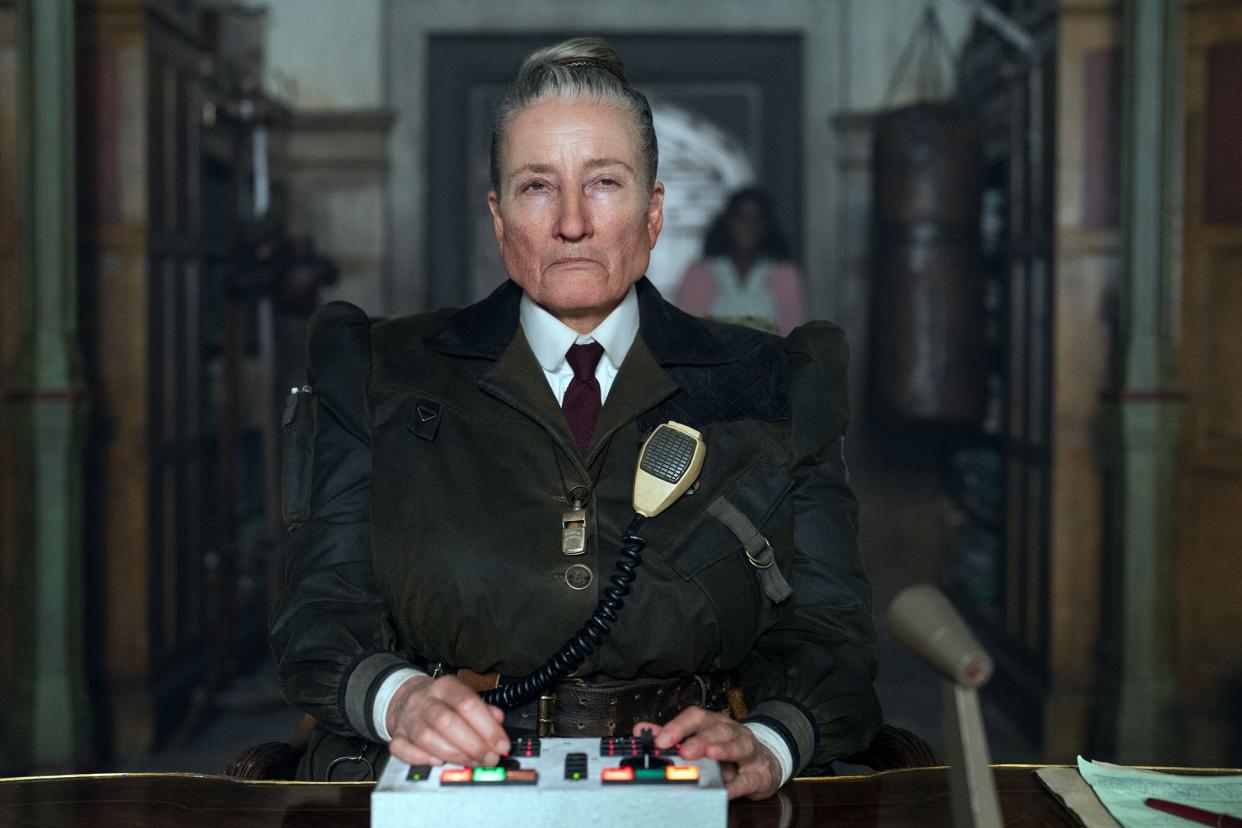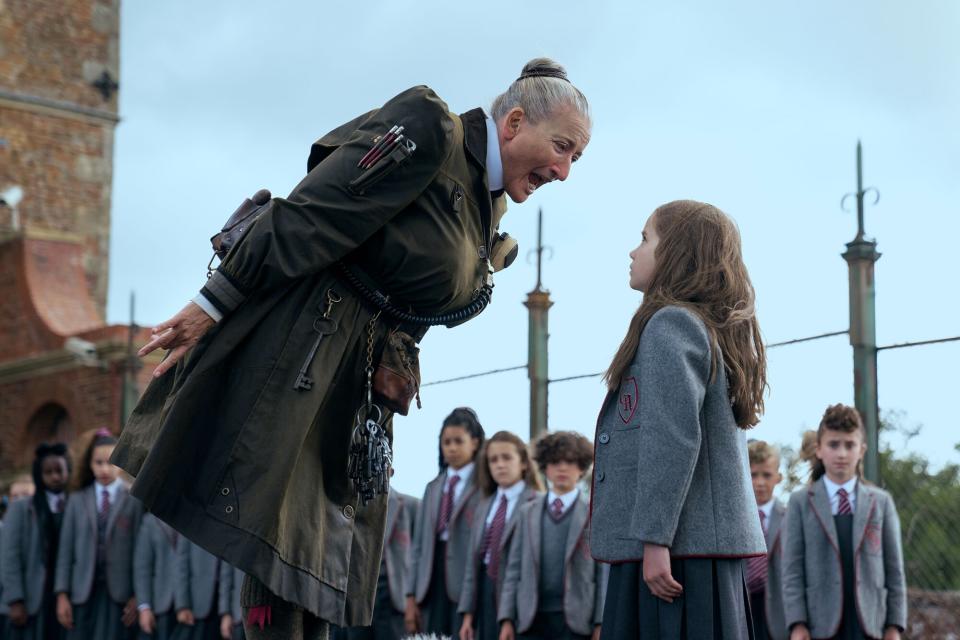Emma Thompson on her biggest transformation ever as Matilda 's menacing Miss Trunchbull

- Oops!Something went wrong.Please try again later.
- Oops!Something went wrong.Please try again later.
- Oops!Something went wrong.Please try again later.
Emma Thompson knows that sometimes it's good to be bad.
The Oscar winner undergoes her most dramatic onscreen transformation yet to play Miss Trunchbull, the sadistic and abusive principal of young Matilda's (Alisha Weir) school, in Netflix's film adaptation of the 2011 West End stage production of Roald Dahl's Matilda the Musical.
Thompson's radical change in appearance required three hours in the make-up chair each day — which informed her acting work.
"It's very existential," she tells EW of assuming such a grotesque form. "It's an out-of-body experience. That is freeing. I don't feel a desperate need to get away from myself or anything. But it is a form of release to be able to inhabit another soul in that way, [a way] that's very physical. When the physicality helps you to find who this person is, it's a great privilege."
The musical adaptation, which hits Netflix Dec. 25, finds Thompson singing, throwing children by their pigtails, and menacing her way through her job, all while hoarding chocolate cake.
We caught up with Thompson discuss learning to hammer throw, how she justified Agatha Trunchbull's behavior to herself, and the ways her literary upbringing still shapes her acting choices.

Dan Smith/Netflix
ENTERTAINMENT WEEKLY: You have a very impressive CV of literary-related work. Where does Roald Dahl's storytelling rank for you?
EMMA THOMPSON: I grew up being deeply influenced by Charlie and the Chocolate Factory and James and the Giant Peach in particular. I love Dahl's writing and I read like Matilda as a child. I mean, not the Dostoevsky, but I read all the time. You couldn't get me out of a book. I identify with that part of her. I'm so grateful that I read such wonderful writers when I was a child. There's a great book actually by a British author called Francis Spufford called The Child That Books Built. That's such a wonderful image. Because whatever we do get given to read when we're little, it really is a huge influence on us. I can remember being inside those books. I can remember stories I read when I was very young and being actually inside them. It is really an escape from your life or a way of experiencing something different inside your imagination. It's such a magical thing for a child to be able to do.
Matilda the Musical trailer delivers a dark but soaring take on the Roald Dahl classic
You have done a lot of work related to children's literature, whether it's Nanny McPhee or your Peter Rabbit stories or the Harry Potter series. What about children's literature specifically fascinates you or makes it stand apart for you?
I'm not sure. I've got a feeling that it's to do with my father. He wrote a series called The Magic Roundabout, which was very successful in the sixties and seventies and was an accidental thing that he fell into. It was very popular with adults, even though it was for children. I've just written another book for children actually, and the BBC hauled up an archive interview with my dad, where he said he was asked the same question basically. And he said, "There's no such thing as children. They're just people who haven't lived as long as we have." They might have less experience, but they want to know what the real world is. He'd go from writing like that something for children to, for instance, directing R.C.Sherriff's Journey's End, which is a very moving, tragic play about the First World War. As a developing child with a creative bent, I experienced watching my creative parents doing very different things.
Is that part of the appeal of Dahl for you specifically? His stories are weird and scary and don't sugarcoat anything.
Yes. I never forget the cruelty of Aunt Sponge and Aunt Spiker in James and the Giant Peach. They're really horrible to him, you know? All the great authors, their stories weren't written down for children. I didn't feel as though they were using language that was specially designed for someone who wasn't ready for adult words.
How much input did you have into your look and this version of Trunchbull?
Oh, a lot. They were a fantastically collaborative team. They had all sorts of plans. Our director, Matthew [Warchus] wanted her to wear contact lenses, like dark contact lenses, because he wanted me to look very different. He said, "You've got these lovely blue eyes," and I said, "But Hitler had blue eyes. It's not like blue eyes are nice; it's just that you've seen my blue eyes looking nice. I will make sure that this version of my blue eyes will not be nice. I promise you, you won't miss the contact lenses." And he really didn't. They were thinking to put a great big prognathis forehead on me. I said, "No, don't cover this bit up (points to her forehead) because I'll be doing all the expression here. I need this bit to express her. You can put it here (points to her chin) because I don't use this bit as much." Then, her nose is fine because once you've done the chin, my nose will look too feeble. It'll look weak. I need a strong nose. We worked it out like that, with what's the least we can get away with?
How did this compare to Nanny McPhee in terms of hair and make-up and transforming?
The thing about Nanny McPhee, which is something I'm grappling with at the moment, because we're transferring Nanny McPhee onto the stage as a musical. I've been working on that for six years, and one of the big questions we've been working on is, "Why does Nanny McPhee change? Why does her physical appearance change?" Because we can't say that ugly is bad and beautiful is good. That's not the point. Because she's good when she arrives. She just happens to look frightening. It's about the way in which she's seen. Has she changed or have you changed? Because Nanny McPhee doesn't change. Physically she does. But within she's the same. And I suppose Trunchbull is the physical expression of her internal rage and despair. It's quite a different form of mask work.

Dan Smith/Netflix
How did you make sense of Agatha's choices and where she was coming from and why she hates children so much?
I thought the only way it could be possible for a human being to behave like that is if they were very, very badly treated very early on in childhood and throughout. I found a really interesting history of a woman called Edith Sitwell, a 1930s poet. She was born in the Victorian era, and she was very, very tall and had a bent spine and a bent nose when she was born. Her rather aristocratic family put her into these metal iron machines to straighten her spine and would tie her into them overnight. I thought, if you were a child and this cruel, painful thing was being done to you, and there's nothing you could do about it, you could turn into someone like Trunchbull. You could turn into someone who hates their own helplessness so much that later in life, having not done any realization or work on it, as soon as they see a fragile child, hates them because it represents their own pain. That's how I worked it. It really helped because it meant it wasn't about the children, it was about her.
She's an Olympic champion in the hammer throw, a skill she uses to punish children. Did you have to do any sort of training for that?
I did. We had a professional athlete, a hammer thrower, who came and showed me how to throw a hammer. There's a shot of me throwing not an actual hammer or an actual child (laughs), but throwing and then getting in the position. We had to have that as well. That shot is a combination of me and the professional, Justin. We had a prosthetic, pretend child who was fantastically heavy actually. I had to say them, "I can't throw this child. She's too heavy." She was made of a very heavy kind of plastic. But they've done a wonderful job on it because it really does look so convincing.
In 2022, you bared yourself, literally, in Good Luck to You, Leo Grande and then did the opposite, covering yourself completely as Trunchbull. Is one more intimidating or challenging than the other?
For sure. Yes. On a personal level, absolutely. Leo Grande is a totally different revelation. That was an extraordinary experience, and it's very interesting to have those two movies out in the same year. These two strange bookends. Someone who's so, so vulnerable, Nancy Stokes, and someone who's also actually deeply vulnerable. Like all bullies.
Related content:

